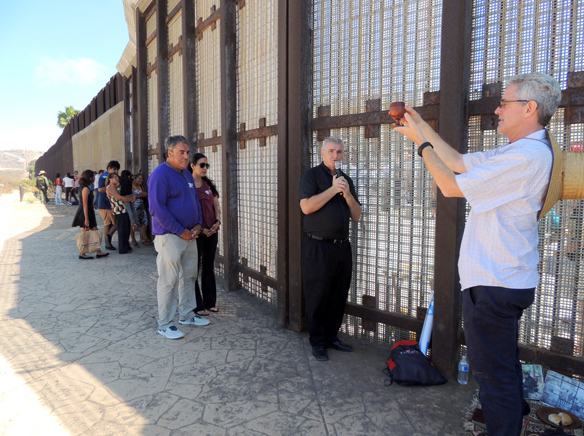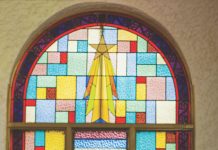La Mesa resident John Fanestil, an ordained pastor of the United Methodist Church, is a living testament of what friendship extending across the international border can look like. Each Sunday afternoon at the big wall separating the U.S. from Mexico in Friendship Park within Border Field State Park, Fanestil holds a binational communion service of the El Faro: The Border Church in English and Spanish.
La Mesa resident John Fanestil, an ordained pastor of the United Methodist Church, is a living testament of what friendship extending across the international border can look like. Each Sunday afternoon at the big wall separating the U.S. from Mexico in Friendship Park within Border Field State Park, Fanestil holds a binational communion service of the El Faro: The Border Church in English and Spanish.
At Border Field State Park on Sundays at 1 p.m., Fanestil joins Father Dermot Rodgers, an independent Roman Catholic priest, to hold a communion service for anyone who wants to partake on either side of the border. The Border Patrol opens the gate in the first wall and gives them permission to walk across a plaza known as Friendship Park. Pat Nixon dedicated the park in 1971, but the building of the second wall in 2009 severely restricted access.
Fanestil and Rodgers walk to the second wall where they hold the liturgical and communion service. People bring some snacks and a chair to sit a while and talk with their family members, some of whom they may see for the first time in years, talking with them through the wall’s tiny half-inch holes. The border wall extends from 300 feet out in the ocean for miles into the desert.
Pastor Guillermo Navarrete of the Methodist Church of Mexico helps set up the sound system so that all can hear the prayers and liturgy service by Fanestil and Rodgers. Navarrete and his team feed people each Sunday on the Mexico side of Friendship Park, the majority of them people who have been deported to Tijuana and separated from their families.
“Tu dedocito,” Navarrete says, inviting his neighbors to the north to push their little finger through the wall.
“Dios te bendiga,” Navarrete says as he touches his neighbor’s little finger.
The service of Border Church is simple. After praying together and reading a verse or two from the Bible, Fanestil and Rodgers consecrate the elements and offer communion to anyone who would like to receive it.
Frequently, a meal is served after communion to those on the Mexican side of the fence, but people on the United States’ side are required to leave Friendship Park at 2 p.m.
The border situation first impacted Fanestil greatly when he was appointed as a pastor to the Calexico United Methodist Church. This was during the 1990’s, when the U.S. government was beginning to invest massively in border security and immigration enforcement.
“The people of this church described themselves as a ‘bilingual, multicultural family of God,’ and taught me a tremendous amount what it meant to live as part of extended families that span the international boundary.
“I saw first-hand the suffering of families whose lives were disrupted by policies implemented by politicians in Washington, D.C., who didn’t really understand how life works on the border,” said Fanestil, who is also an author.
As a young adult, Fanestil’s knowledge of Mexico was limited to a few church mission trips. His principal interest was in Central America where he had traveled several times and was active in the solidarity movement for peace. As part of his training to become a pastor, he studied for one year at a seminary in San Jose, Costa Rica. As a result, he learned to speak Spanish as fluently as English.
When in 2006, the federal government seized land from the state of California in order to bud walls along the western-most section of the US-Mexico border, Fanestil’s passion for the border situation intensified. In 2008, government officials announced their intention to close Friendship Park.
“The promised closure of Friendship Park also threatened to permanently separate families, many of whom rely on this location as the only place they can see their loved ones in the flesh,” he said.
It was the summer of 2008 that Fanestil started to serve communion in solidarity with the families who meet there.
The issues facing these families are overwhelming.
“Forcible separation of families is catastrophic for families, and the most traumatized are the youngest and most vulnerable members of these families—the children, the elderly, the disabled, the sick. There are many social problems, drugs and addiction, poverty and employment, mental health,” Fanestil said.
But the public can help, if only to visit Friendship Park and educate themselves on the border situation.
“The US-Mexico border can be a place of friendship, harmony and communion. We try to demonstrate that each Sunday at Friendship Park,” Fanestil said.
From 2007 to 2014 Fanestil served as Executive Director of Foundation For Change, an organization committed to creating a more progressive future for the San Diego/Tijuana region. For more information, go to www.foundation4change.org. He currently serves as Pastor of Faith Cultivation & Leadership Development at the First United Methodist Church of San Diego. For more information, go to www.firstchurchsd.com.













